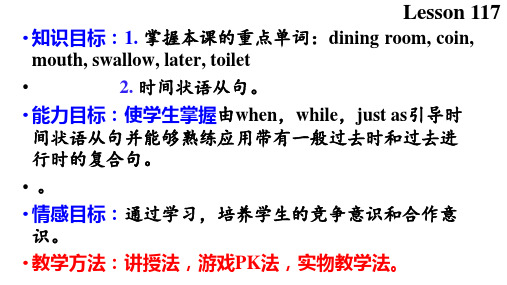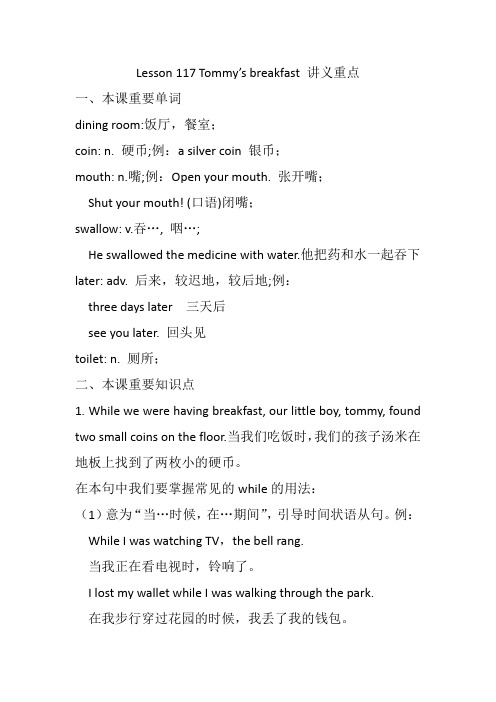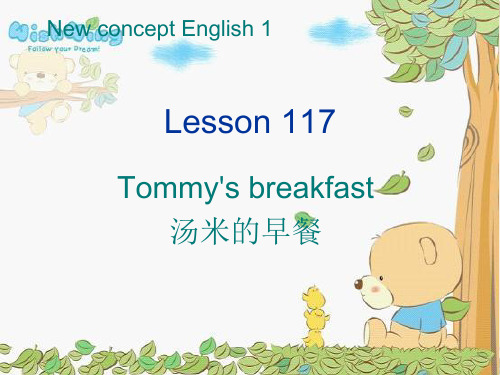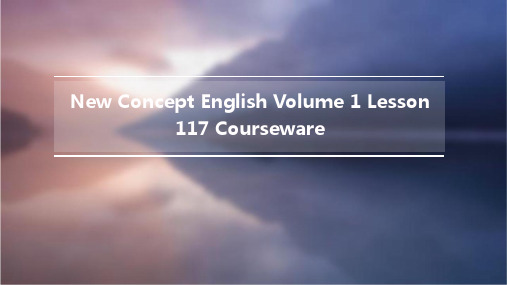新概念英语117课讲义
新概念第一册117课

• While we were having breakfast, our little boy, Tommy, found two small coins on the floor. • • He put them both into his mouth. We both tried to get the coins, but it was too late. Tommy had already swallowed them!
② v. 吞并;侵吞
Our company was swallowed up by an American company last year. 我们公司去年被一家美国公司吞并了。
Key words&expressions
★ mouth
• • • • • •
n. 嘴 Open your mouth. 张开你的嘴。 eyebrows, eyes, nose,闭嘴(口) ears, mouth Shut your mouth. 眉毛,眼睛,鼻子,耳朵,嘴巴 from hand to mouth 勉强糊口 from mouth to mouth口口相传的 have a big mouth大嘴巴,嘴不严
Key words&expressions
★ coin n. 硬币 (note 纸币) toss a coin 掷硬币(打赌正面或反面) • Pay a person back in his own coin. 以其人之道还治其人之身。
later 1) adv. 后来,较迟地,较后地 e.g. three days later 三天后 e.g. He came later than usual. 他比平常来得晚。 2)adj. 较迟的,较后的,更近的。 e.g. Let‟s take a later train. 我们搭晚一点的火车吧。 drop v. (意外)掉落;使掉落 e.g. A drop in the bucket/ocean.
Lesson117(课件)新概念英语第一册

翻译下列句子。 • 1. 当我到达时,她正在做饭。 • When I __a_r_ri_v_e_d_, she_w_a_s___ _c_o_o_k_in_g_ a meal. • 4. 当我读书时,我妈妈正在做饭。 • _W__h_i_le____I was reading , • my mother __w_a_s_____ __c_o_o_k_i_n_g_____.
• A. him B. his
C. himself D. it
• (A) 4. Have you ever _______ Shenzhen?
• A. been to B. gone to C. went to
D. gone in
• (C ) 1. When he _______ I _______ a bath.
do housework
phone me from the office
一、选择题
• (C) 1. I _______ my pen everywhere but I couldn’t _______ it.
• A. looked for, found
B. found, looked for
• C. looked for, find
•。
• 情感目标:通过学习,培养学生的竞争意识实物教学法。
翻译下列句子。 • 1. 当我到达时,她正在做饭。 • When I ________, she______ _______ a meal. • 2. 当我读书时,我妈妈正在做饭。 • _________I was reading , • my mother _________ _____________.
While ... have breakfast, Tommy, find two small coins
(完整word版)新概念英语117课讲义

(完整word版)新概念英语117课讲义Lesson 117 Tommy’s breakfast 讲义重点一、本课重要单词dining room:饭厅,餐室;coin: n. 硬币;例:a silver coin 银币;mouth: n.嘴;例:Open your mouth. 张开嘴;Shut your mouth! (口语)闭嘴;swallow: v.吞…, 咽…;He swallowed the medicine with water.他把药和水一起吞下later: adv. 后来,较迟地,较后地;例:three days later 三天后see you later. 回头见toilet: n. 厕所;二、本课重要知识点1. While we were having breakfast, our little boy, tommy, found two small coins on the floor.当我们吃饭时,我们的孩子汤米在地板上找到了两枚小的硬币。
在本句中我们要掌握常见的while的用法:(1)意为“当…时候,在…期间”,引导时间状语从句。
例:While I was watching TV,the bell rang.当我正在看电视时,铃响了。
I lost my wallet while I was walking through the park.在我步行穿过花园的时候,我丢了我的钱包。
(2)意为“虽然,尽管”,引导让步状语从句。
例:While it was late,he went on working.虽然很晚了,但他还在继续工作。
While he is in poor health,he works hard.虽然他身体不好,但他还是努力工作。
2. We both tried to get the coins, but it was too late.我们都试图把两枚硬币拿出来,但太迟了。
新概念英语Lesson 117-118讲义

__________________________________
4.当他在刮胡子的时候刮伤了自己
__________________________________
5.当我正在花园工作的时候我妻子正在做饭
__________________________________
2.While we were having breakfast, our little boy, Tommy, found two small coins on the floor.
当我们正在吃早饭的时候,我们的小男孩Tommy在地板上发现了两枚硬币
3.When I was doing housework, my husband phoned me from the office.
★当引导瞬间性动作时必须用when
★当两个动作同时发生并且有对照的意思时用while
习题
翻译下列句子
1.当我正在吃早饭的时候有人敲门
__________________________________
2.当我正要离开房子的时候邮递员到了
__________________________________
4. put ….into….把….放进…..
5. try to do sth努力做某事
6. phone sb from the office从办公室打电话
7.have been to去过某处(已经回来)
have gone to去某处了(还没回来)
Sentences
1.When my husband was going into the dinning room this morning, he dropped some coins on the floor.当我丈夫正走进餐厅的时候把一些硬币撒在地板上了
(完整word版)新概念英语117课讲义

Lesson 117 Tommy’s breakfast 讲义重点一、本课重要单词dining room:饭厅,餐室;coin: n. 硬币;例:a silver coin 银币;mouth: n.嘴;例:Open your mouth. 张开嘴;Shut your mouth! (口语)闭嘴;swallow: v.吞…, 咽…;He swallowed the medicine with water.他把药和水一起吞下later: adv. 后来,较迟地,较后地;例:three days later 三天后see you later. 回头见toilet: n. 厕所;二、本课重要知识点1. While we were having breakfast, our little boy, tommy, found two small coins on the floor.当我们吃饭时,我们的孩子汤米在地板上找到了两枚小的硬币。
在本句中我们要掌握常见的while的用法:(1)意为“当…时候,在…期间”,引导时间状语从句。
例:While I was watching TV,the bell rang.当我正在看电视时,铃响了。
I lost my wallet while I was walking through the park.在我步行穿过花园的时候,我丢了我的钱包。
(2)意为“虽然,尽管”,引导让步状语从句。
例:While it was late,he went on working.虽然很晚了,但他还在继续工作。
While he is in poor health,he works hard.虽然他身体不好,但他还是努力工作。
2. We both tried to get the coins, but it was too late.我们都试图把两枚硬币拿出来,但太迟了。
在本句中我们要掌握all与both的用法及区别:“全部”。
新概念英语第一册117课课件45358教学教材

Theyห้องสมุดไป่ตู้were not watching TV. 3、疑问句:was/were + 主语+ 现在
分词
Was he writing a letter last night?
❖ 常用时间状语
When, while, a moment ago, from nine to ten last evening, at that time ❖ when既指时间点,也可指一段时间, while只指 一段时间,因此when引导的时间状语从句中 的动词可以是终止性动词,也可以是延续性动 词,而while从句中的动词必须是延续性动词。
o’clock last night.
Practice Time!
1. While she ___ TV, Penny ___ asleep.
A. watches, was falling B. was watching, fell C.was watching, was falling D. watch, fell KEY: B
7. Mike and I___(play) basketball at that time yesterday afternoon.
课文讲解
❖ When my husband was going into the dining room this morning, he dropped some coins on the floor.
❖ There were coins everywhere. We looked for them, but we could not find them all.
❖ everywhere 到处 ❖ look for 寻找(强调动作和过程) ❖ find 找到 (强调寻找的结果) ❖ 我找遍了任何地方都找不到我的钢笔。
新概念一117课精美课件

今天8:00am
他正在看书。
He is reading a book.
她正在看书。
She was reading a book.
昨天8:00am
过去进行时
1.构成
主语+was/were +现在分词
2. 过去进行时的基本用法
1)表示过去某一时间正进行的动作。 They were shaving at seven this morning. 今晨7点钟的时候他们正在刮胡子。
bedroom
kitchen
卧室
厨房
coin 硬币 note 纸币
Swallow
1)v. 吞……,咽……
He swallowed (up) the madicine with water.
他把药和水一起吞下。
2)n.燕子
later
1)adv. 后来,较迟地,较后地 three days later 三天后
Lesson 117 Tommy’s breakfast
dining room
饭厅
n.硬币
n.嘴 v.吞下 adv.后来
coin
mouth swallow lining room dining table
饭厅,餐室 餐桌
sitting room / living room 客厅
几天后他们要离开。
Homework: 上课:周日10:10--12:10 作业:1.预习119 2.初中卷子
Thank you !
sooner or later 早晚,总有一天
2)adj. 较迟的,较后的,更近的 in one’s later life 在晚年
toilet
n. 厕所,盥洗室
新概念英语第一册117课课件

Words and expressions
The text includes a variety of useful vocabulary and expressions related to learning English.
04
reading comprehension
Reading materials
Text
"The Olympic Games"
Background information
The history and development of the Olympic Games, the significance of the Games in modern society, and the role of the Olympics in promoting global peace and friendship.
Some examples of words and expressions are: "global language," "interconnected world," "essential," "communication," "learning curve," "fluency," "conversational skills."
01
Sorting out the content of the text
Topic of the text
The topic of the text is about the importance of learning English.
- 1、下载文档前请自行甄别文档内容的完整性,平台不提供额外的编辑、内容补充、找答案等附加服务。
- 2、"仅部分预览"的文档,不可在线预览部分如存在完整性等问题,可反馈申请退款(可完整预览的文档不适用该条件!)。
- 3、如文档侵犯您的权益,请联系客服反馈,我们会尽快为您处理(人工客服工作时间:9:00-18:30)。
Lesson 117 Tommy’s breakfast 讲义重点
一、本课重要单词
dining room:饭厅,餐室;
coin: n. 硬币;例:a silver coin 银币;
mouth: n.嘴;例:Open your mouth. 张开嘴;
Shut your mouth! (口语)闭嘴;
swallow: v.吞…, 咽…;
He swallowed the medicine with water.他把药和水一起吞下later: adv. 后来,较迟地,较后地;例:
three days later 三天后
see you later. 回头见
toilet: n. 厕所;
二、本课重要知识点
1. While we were having breakfast, our little boy, tommy, found two small coins on the floor.当我们吃饭时,我们的孩子汤米在地板上找到了两枚小的硬币。
在本句中我们要掌握常见的while的用法:
(1)意为“当…时候,在…期间”,引导时间状语从句。
例:While I was watching TV,the bell rang.
当我正在看电视时,铃响了。
I lost my wallet while I was walking through the park.
在我步行穿过花园的时候,我丢了我的钱包。
(2)意为“虽然,尽管”,引导让步状语从句。
例:
While it was late,he went on working.
虽然很晚了,但他还在继续工作。
While he is in poor health,he works hard.
虽然他身体不好,但他还是努力工作。
2. We both tried to get the coins, but it was too late.
我们都试图把两枚硬币拿出来,但太迟了。
在本句中我们要掌握all与both的用法及区别:
“全部”。
both指两个人或物都、、、,(1)all , both, 表示“都”,
而all指三个或三个以上的人或物都、、、,例:
Both of us want to go. 我们两人都想去。
All of us should work hard.我们都应努力工作。
(2)both的反义词是neither, all的反义词是none。
neither 指“两者都不、、、”none指“三者或三者以上都不、、、”例:Neither of us is a doctor. 我们俩都不是医生。
None of the books is helpful.所有这些书都对人没有帮助。
三、重要语法:过去进行时
过去进行时表示在过去某一时刻或某一段时间内进行或发生的动作。
常与表示过去的时间状语连用。
(一)基本结构
过去进行时基本结构为:主语+was/were+动词的现在分词,例:
What were you doing when I rang you up?
我给你打电话时你在干吗?
I was having a bath at that time. 那时我在洗澡。
We were having supper when the phone rang.
我们正在吃晚饭时电话响了。
Was he playing basketball at four yesterday afternoon?
昨天下午四点他在打篮球吗?
(二)基本用法
过去进行时主要表示过去某时的一个动作正在进行。
例:He fell asleep when he was reading.
他看书时睡着了。
Mary was making a dress when she cut her finger.
玛丽做衣服的时候割破了手。
(三)句型转换
(1)由肯定句转换成一般疑问句
在过去进行时做主句的情况下,由肯定句转换成一般疑问句只需要把was/were提前即可。
例:
We were having supper when the phone rang.(转换成疑问句)我们正在吃晚饭时电话响了。
Were you having supper when the phone rang?
电话铃响了的时候你们正在吃饭吗?
Mary was making a dress when she cut her finger. (转换成疑问句)
玛丽做衣服的时候割破了手。
Was Mary making a dress when she cut her finger?
玛丽是在做衣服的时候割破了手吗?
(2)由肯定句转换成否定句
在过去进行时做主句的情况下,由肯定句转换成否定句只需要在was/were后边加not即可。
例:
We were having supper when the phone rang.(转换否定句)我们正在吃晚饭时电话响了。
We were not having supper when the phone rang.
电话铃响的时候我们没有正在吃饭。
(四)标志词:
过去进行时标志词一般为过去的某一个具体的时间,例:last短语:last week; last night; from nine to ten last evening; yesterday短语:yesterday morning;yesterday afternoon;at that time:在那时;等等。
